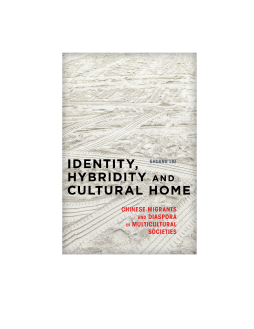
Additional Information
Book Details
Abstract
The Chinese have been one of the oldest and largest ethnic communities across the world with well over 35 million people living overseas. Despite their relatively large cultural distance from the host countries, and the ordeals faced by generations of Chinese immigrants due to stereotypes, prejudice, and racism, many have adjusted remarkably well economically and socially in their new country. But how do generations of Chinese immigrants reconcile seemingly incompatible demands from home and host cultures to negotiate bicultural or multicultural identities?
Identity, Hybridity and Cultural Home explores the multifaceted concept of cultural identity to uncover the meaning of cultural home for Chinese immigrants in multicultural environments. It questions the conventional notion of a stable and secure cultural identity, challenges the common conception of bilingualism and biculturalism, analyses hybrid identities, and identifies directions for future research on the critical issue of searching for a cultural home in a multicultural society.
Shuang Liu is a Senior Lecturer in the School of Communication and Arts at the University of Queensland.
The book’s strength lies in its interdisciplinary approach, which offers rich theoretical insights on assimilation, diaspora, hybridity, bilingualism, and multiculturalism. The book is beneficial not only to scholars of international migration but also to those working in communication, psychology, sociology, anthropology, and cultural studies with an interest in exploring cross-cultural exchanges and identity formation. . . . The book is a tour de force of theory and interdisciplinary dialogues. Liu’s investigation of generational differences and interracial families probes into two of the least-studied aspects of the Chinese diaspora. Her research adds further knowledge to the complexities and nuances of global Chinese identities. Furthermore…her portrayal of the Chinese diaspora in contemporary Anglo-American societies illustrates constant and multiple shifts between an essentialist mode in the search for belonging and an anti-essentialist mode of blending, negotiation, and adaptation. This offers a more complicated and dynamic way to rethink the current debate on diaspora and inter-cultural identities, which often gravitates toward either one of the modes.
This book contains a fascinating and comprehensive exploration of acculturation, hybridity, and cultural home, using as its example the massive Chinese diaspora. Liu’s work is at the cutting edge, moving well beyond traditional ideas of acculturation to a nuanced and dynamic discussion of cultural identity. This work is a must-read for anyone interested in acculturation or in Chinese culture.
Cindy Gallois, Emeritus Professor of Psychology and Communication, University of Queensland
The book is a rare comprehensive examination of cultural identity drawing from
scholarship across disciplines. The author explores experiences of people residing
in a space of 'collapsed boundaries,' at first focusing on Chinese diaspora with all
its complexity, and offers insight to this culture from the angle of an identity without
one typical anchor or a ‘cultural home.’
Ling Chen, Professor of Communication Studies, Hong Kong Baptist University
Based on the experiences of Chinese immigrants in multicultural societies, this book deals with issues of identity, hybridity, and cultural home from an interdisciplinary approach. The book not only reviews and challenges existing theories, but also provides valuable suggestions for future research. It is a remarkable study, which broadens readers’ perspective and expands the inquiry in this globalizing society.
Guo-Ming Chen, Professor of Communication Studies, University of Rhode Island
